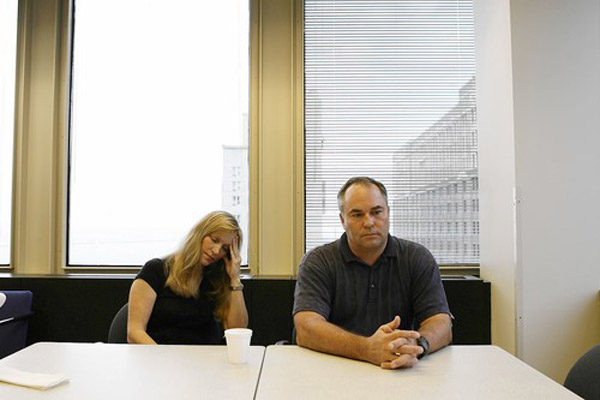
The parents of Christina Eilman
The city council is expected to okay two massive settlements in lawsuits against the Chicago Police Department, including the largest in the city's history, $22.5 million dollars to Christina Eilman and her family:
Though the settlement is a staggering sum on its own, Mayor Rahm Emanuel's administration has placed a second eight-figure police settlement on Tuesday's City Council Finance Committee agenda. A $10.2 million settlement is proposed for one of the victims of notorious former police Cmdr. Jon Burge, bringing to nearly $33 million the amount aldermen could vote to pay victims of police misconduct in a single day.
The latest Burge settlement would be for Alton Logan, who spent 26 years in prison for a murder he did not commit and who alleged in a federal lawsuit that Burge's team of detectives covered up evidence that would have exonerated him — a departure from previous cases that documented torture used by Burge's team to extract false confessions. The Logan case would bring the tab on Burge cases to nearly $60 million when legal fees are counted. Burge is serving 41/2 years in federal prison for lying about the torture and abuse of suspects.
The Tribune detailed the tragic and confusing story of Eilman in several pieces; she is a bipolar woman from California who was arrested at Midway and later released near the Robert Taylor Homes, where she was sexually assaulted and fell, or was thrown, from a seven-story window. She survived, but with severe and unrecoverable brain injuries. In 2006, David Heinzmann did a remarkable job recreating the events of that night, but the mystery ultimately remains of why Eilman, suffering from mental illness, was released from the Wentworth station. The only extant explanation, besides contradictory claims that Eilman did not seem mentally ill:
Officer Rosendo Moreno told investigators that while Eilman was being held at the Chicago Lawn District near Midway, he heard Lt. Carson Earnest tell Moreno's partner, Officer Richard Cason, to take Eilman to the hospital. But Cason responded that he and Moreno didn't have a car to transport her, according to Moreno.
In his lawsuit deposition, Moreno said he did not recall the conversation, but when Eilman's lawyer reminded Moreno of his statements to internal affairs investigators, he acknowledged it had taken place.
The family sought $100 million dollars; $22.5 million is still a massive amount. And it's massive compared to what other cities pay out. But it's not actually that much compared to recent years in Chicago, which pays out an unusual amount compared to its civic peers, as Mick Dumke found in a 2008 report for the Reader. If you count other departments, $33 million is in the ballpark:
Scores of suits have been filed against other city departments, and through just the first six months of [2008] Chicago was already on the hook for some $80 million in settlements and court judgments. That's far more than in any recent year in Chicago—up from about $34 million in 2005. And it doesn't even include the $12 million spent to settle hundreds of suits related to the Shakman consent decrees, a series of federal court orders banning patronage hiring and firing, or the $11 million it took to settle a dispute with Millennium Park contractors—both paid in 2008 after years of litigation. That's a total of more than $100 million to close lawsuits from January through June.
Lawsuits against the CPD get a lot of attention, because so many of the cases are shocking: the wrongful conviction of Alton Logan, the unimaginable plight of Christina Eilman. And they make up more of the city's tab than other cities. But it's still not the majority of it: "Lawsuits involving the police account for about 44 percent of Chicago's settlements and judgments. In New York and LA they account for only about a quarter. And the amount Chicago is spending to close police-related lawsuits is increasing—from about $23 million for all of 2005 to more than $62 million for the first half of 2008." And the raw numbers for all settlements are just staggering: more money, from 2005-2008, than Los Angeles (three times as much), more than Houston (about seventeen times as much).
Photograph: Chicago Tribune



Comments are closed.